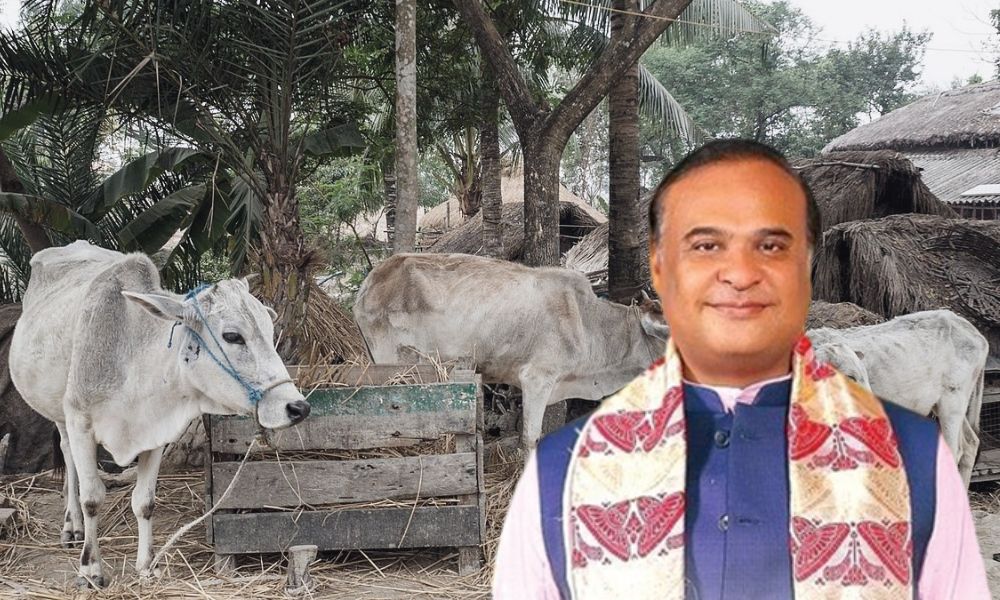
Credits: Wikimedia Commons, assam.gov.in
Assam's Cattle Bill Sparks Debate On Social Media
Assam, 13 July 2021 12:23 PM GMT | Updated 13 July 2021 12:44 PM GMT
Editor : Madhusree Goswami |
A mountain girl trying to make it big in the city. She loves to travel and explore and hence keen on doing on-ground stories. Giving the crux of the matter through her editing skills is her way to pay back the journalism its due credit.
Creatives : Ratika Rana
Her primary objective is to inform, promote, educate and cultivate readers through writing.
The bill has some contentious clauses, including a bar on the purchase of beef or beef products in areas "predominantly inhabited by Hindu, Jain, Sikh and other non beef-eating communities", or "within a radius of 5 km" of a temple.
The new Cattle Protection Bill tabled in the Assam Legislative Assembly by Chief Minister Hemanta Biswas Sarma has sparked a discussion on social media. The bill banned the sale and purchase of beef or beef products in areas dominated by Hindus, Jains, Sikhs and other 'non-beef-eating communities'. It further dictated that there would be no beef selling shop within a 5 km radius of a temple. The bill aims to regulate the slaughter, consumption and illegal transportation of cattle. However, several clauses of the bill have raised eyebrows of citizens across the country.
Questionable Clauses
The bill bars the purchase of beef or beef products in areas "predominantly inhabited by Hindu, Jain, Sikh and other non beef-eating communities", or "within a radius of 5 km" of any temple or sattra (Vaishnative monasteries). Imagining various scenarios, the first argument that crops up is that if a person has been selling beef in a particular area for several years and a plan for a new temple in the vicinity is approved, how is the beef seller liable to shift his business? Secondly, who will compensate for the relocation of the business or who will ensure that sale in a new place would be as good as the older one?
Opposition leader Debabrata Saikia questioned the ambiguity of the bill by saying that a 'temple' can be built anywhere by anyone, even by vaguely worshipping a stone at any spot. This analogy could further lead to communal tensions in the state. The bill also bans the trade of beef to Hindu, Jains, Sikhs and other non-beef-eating communities. However, food habits are an extremely personal choice and differ from person to person. The contention here is then who makes sure that a Hindu never eats beef, or a Muslim always eats only beef? It is one of the most popular forms of meat in the southern and northeast parts of India. Discriminating against personal preferences based on communities or religions is not a matter that the state should be entitled to decide.
The proposed law also gives the police officers (above the rank of sub-inspectors) or any other person authorized by the government the liberty to 'enter and inspect any premises under their jurisdiction, where they believe that any 'criminal' act is, or is likely to take place. Such authority was only in the hands of a veterinary officer and certifying officer by the government in the Cattle Protection Bill of 1950.
Penalty For Violating Provisions
The violators are proposed to be imprisoned for anywhere between three and eight years. It also provides for fines between ₹3 lakh and ₹5 lakh. The bill seeks to punish repeat offenders with double the imprisonment and fines for the second and subsequent convictions. Assam is the main gateway to the northeast part of the country. Apart from cattle, almost all goods from other parts of the country are transported to the region via Assam. The bill is likely to affect supplies of cattle to Christian-majority regions where beef is consumed.
Also Read: Haryana Police Arrests Delhi Riots Shooter Rambhakt Gopal For Delivering Communal Speech
 All section
All section














